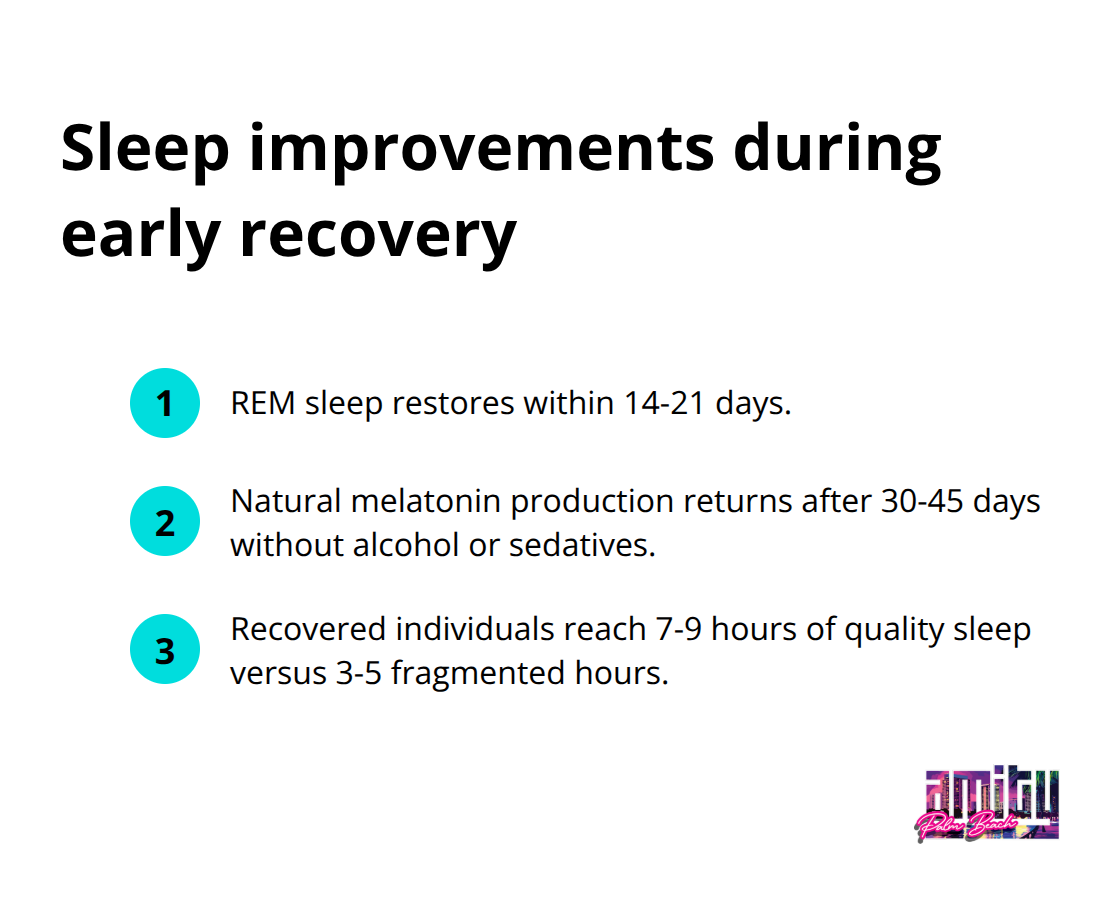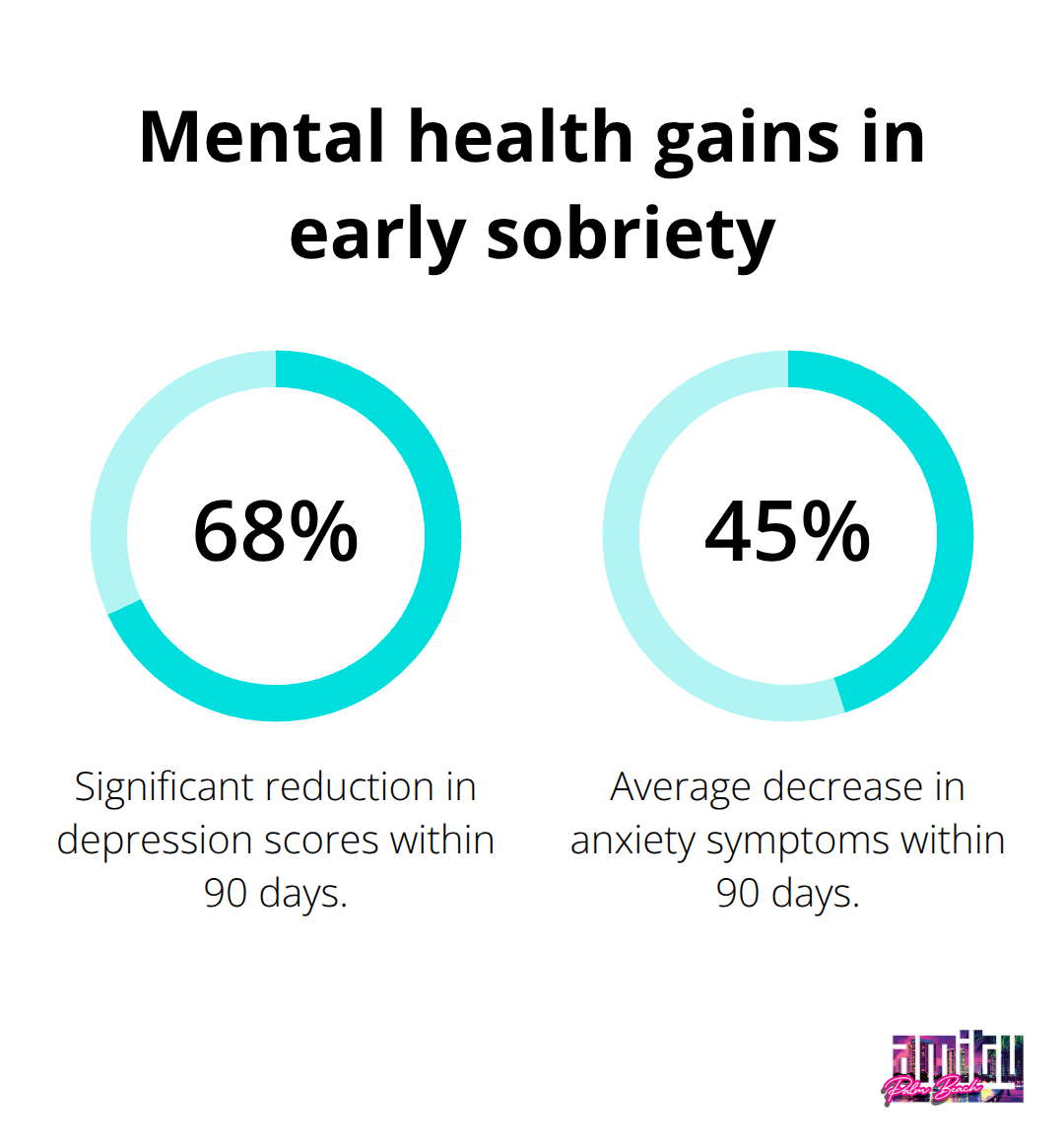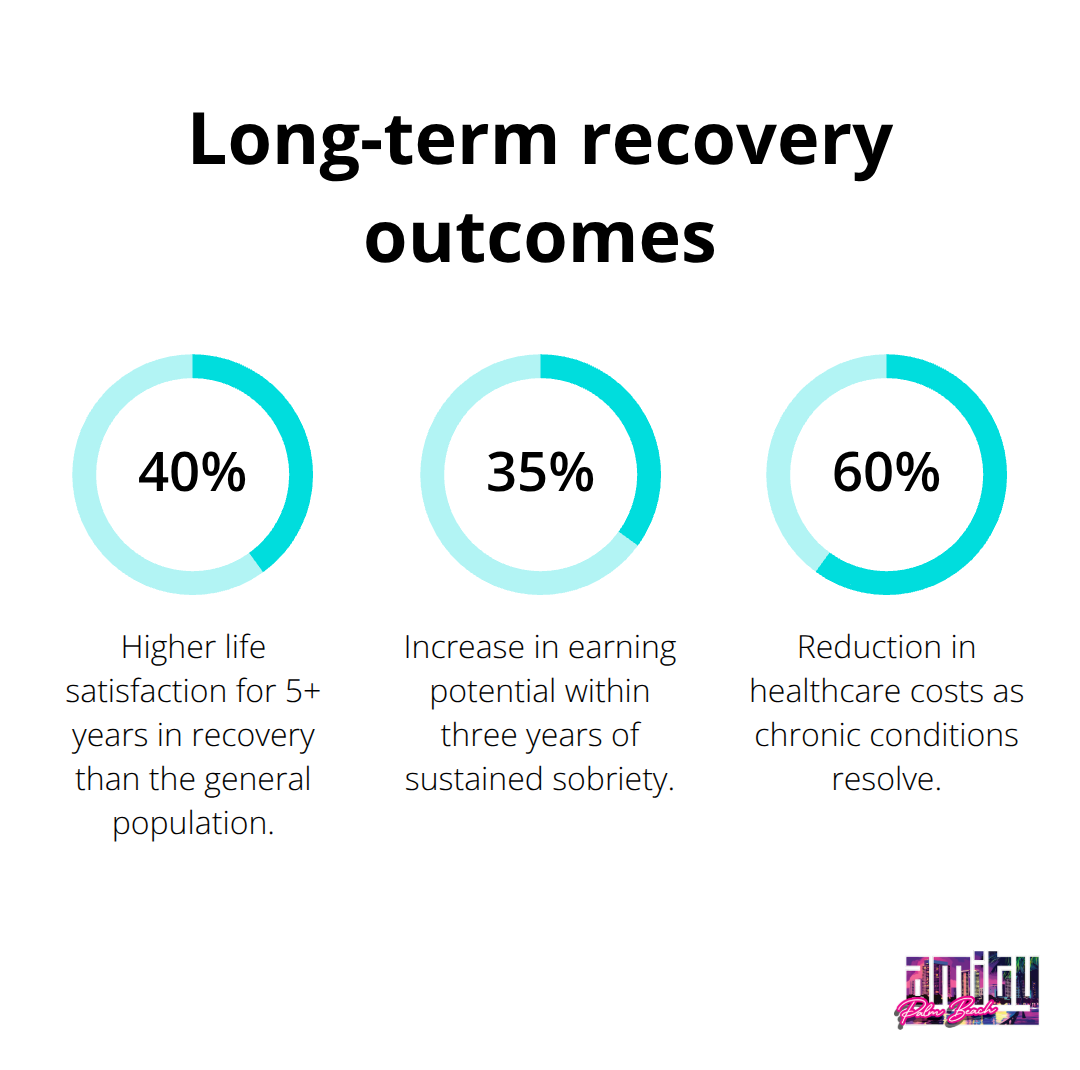Recovery transforms lives in ways that extend far beyond simply stopping substance use. The benefits of recovery from addiction touch every aspect of a person’s well-being.
At Amity Palm Beach, we see firsthand how sobriety creates positive changes in physical health, mental clarity, and relationships. These improvements build the foundation for a fulfilling, sustainable future.
How Does Recovery Heal Your Body
The physical transformation during recovery begins within days and continues for months. Your liver starts to regenerate new cells within days of your last drink, while your cardiovascular system begins to repair damage from stimulants within the first week. The National Institute on Drug Abuse reports that individuals who complete 90-day treatment programs show measurable improvements in organ function, with liver enzymes that normalize in 60% of cases within six months.
Sleep Quality Returns to Normal Patterns
Sleep architecture rebuilds systematically during early recovery. Most people experience REM sleep restoration within 14-21 days, which leads to improved memory consolidation and emotional regulation. Your body produces natural melatonin again after 30-45 days without alcohol or sedatives.

Sleep studies show that recovered individuals achieve 7-9 hours of quality sleep compared to the 3-5 fragmented hours common during active addiction. Better sleep directly translates to increased daytime energy, sharper focus, and improved mood stability.
Your Immune System Strengthens Rapidly
White blood cell production increases 40-60% within the first month of sobriety, according to research from Johns Hopkins. This immune boost means fewer infections, faster wound healing, and reduced inflammation throughout your body. Your lymphatic system, previously compromised by toxins, begins to filter waste efficiently again. Chronic inflammation markers like C-reactive protein drop significantly, which reduces your risk of heart disease and autoimmune conditions.
Cardiovascular Health Improves Dramatically
Your heart rate and blood pressure stabilize within weeks of stopping stimulants or depressants. Circulation improves as blood vessels repair themselves from substance-related damage. Studies show that individuals in recovery experience a 25-30% reduction in cardiovascular disease risk within the first year (compared to active users). Your heart muscle strengthens, and irregular rhythms often resolve completely.
These physical improvements create the foundation for mental and emotional healing that follows closely behind. Poor physical health and chronic stress can undermine recovery efforts, making these bodily improvements essential for effective relapse prevention.
How Does Sobriety Transform Your Mental State
Your brain begins to rewire itself within days of stopping substance use, creating measurable improvements in mental health that compound over time. Dopamine receptors, previously overwhelmed by artificial stimulation, start to normalize within 2-3 weeks, which directly reduces anxiety and depression symptoms. The Journal of Clinical Medicine found that 68% of individuals in recovery show significant reduction in depression scores within 90 days, while anxiety symptoms decrease by an average of 45% during the same period.

Cognitive Function Returns Stronger Than Before
Memory formation improves dramatically as your hippocampus repairs damage from chronic substance use. The brains of those who abstained from alcohol for approximately 7.3 months exhibited significant improvements in brain structure. Your brain processes information faster, makes connections more efficiently, and retains new information with greater accuracy. Executive function skills like planning, decision-making, and impulse control strengthen progressively (with most people reaching pre-addiction baseline within 12-18 months).
Emotional Regulation Becomes Your New Superpower
Sobriety rebuilds your ability to manage emotions without external substances. Your prefrontal cortex, responsible for emotional regulation, strengthens through consistent practice and time away from substances. Research from Harvard Medical School shows that individuals with 18+ months of sobriety demonstrate emotional stability comparable to people who never struggled with addiction. You develop genuine confidence as you accomplish goals without chemical assistance, creating authentic self-esteem rather than artificial mood elevation.
Mental Clarity Replaces the Fog
The mental haze that clouds judgment during active addiction lifts progressively during recovery. Your ability to focus on tasks improves within weeks, while complex problem-solving skills return within 3-6 months. Concentration spans that were previously limited to minutes extend to hours of sustained attention. This mental clarity allows you to make better decisions about relationships, career choices, and personal goals (creating a positive feedback loop that reinforces recovery motivation).
These mental and emotional improvements create the foundation for rebuilding the relationships that addiction often damages or destroys.
How Recovery Rebuilds Your Relationships
The isolation that addiction creates begins to dissolve within weeks of recovery, but rebuilding genuine connections requires intentional effort and specific strategies. Research from the University of Michigan shows that individuals who actively work on relationship repair during their first year of sobriety maintain longer-term recovery rates of 78%, compared to 43% for those who avoid relationship work. Trust rebuilds through consistent actions rather than words – you show up on time, follow through on commitments, and demonstrate reliability in small daily interactions to create the foundation for deeper repair.
Honest Communication Replaces Manipulation
Active addiction trains your brain to manipulate conversations to get what you need, but recovery demands that you learn direct, honest communication skills. Family therapy sessions within the first 90 days of treatment help 65% of participants develop healthier communication patterns, according to the American Family Therapy Academy. You practice specific phrases like expressing needs without demands, acknowledging mistakes without deflection, and listening without preparing your defense.
Trust Rebuilds Through Consistent Actions
Your family members need to see consistent behavioral changes over 6-12 months before they begin to trust your words again. Small actions matter more than grand gestures – you arrive when you say you will, you keep promises about household responsibilities, and you respond to texts promptly. Studies have shown that rebuilding trust after prolonged exposure to addiction-related behaviors requires both structured therapeutic support and consistent behavioral changes over time.
Recovery Communities Provide Practice Spaces
Recovery communities provide practice spaces where you can develop communication skills with people who understand your struggles. These connections create authentic relationships that support long-term sobriety rather than enable destructive patterns. Family therapy in addiction treatment aims to improve relationships and resolve family conflict while supporting your loved one in recovery.
Final Thoughts
Research shows that individuals with five or more years of recovery report life satisfaction scores 40% higher than the general population. Your earning potential increases by an average of 35% within three years of sustained sobriety, while healthcare costs drop by 60% as chronic conditions resolve. The benefits of recovery from addiction compound over time, creating opportunities that seemed impossible during active substance use.

Career advancement becomes possible when you show up consistently, think clearly, and build genuine professional relationships. Many people in long-term recovery achieve educational goals they abandoned during active addiction, with 45% completing degrees or certifications within their first five years of sobriety. Financial stability follows naturally as you redirect money previously spent on substances toward savings, debt reduction, and meaningful investments in your future (the average person saves $3,000-$8,000 annually).
Recovery creates a foundation for authentic happiness that doesn’t depend on external substances or circumstances. You develop genuine confidence through accomplishing goals, maintaining relationships, and contributing meaningfully to your community. We at Amity Palm Beach provide evidence-based treatment and personalized support that makes these long-term benefits possible through our comprehensive approach to addiction recovery.




